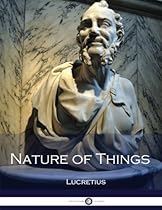Nature of Things

| Author | : | |
| Rating | : | 4.30 (675 Votes) |
| Asin | : | 1536884669 |
| Format Type | : | paperback |
| Number of Pages | : | 140 Pages |
| Publish Date | : | 2017-04-29 |
| Language | : | English |
DESCRIPTION:
The results are both satisfying and readable. A valuable contribution to students of literature as well as philosophy." -- Library Journal. Ensolen includes an elegant introduction on Lucretius, as well as useful notes. "Ensolen has focused on the poet, translating the Latin hexameters into accented pentameter in order to capture the dynamics, rhythms, and syntax of the original
B. S. said The book-cover made the sale!. We were looking for this book at first for the front cover, which is rare and and his painter is one my husband's favorite artist, then, after we read the book we enjoyed the book more than ever. The seller did an excellent job in sending the book fast (overseas) and the price was appropriate as well, thank you!. Poetic philosophy Neil Scott Mcnutt How incredible it is to read a poet and philosopher from 60 B.C. writing on the philosophical derivation of the idea that atoms must exist, that they have some spin on them, and that there is conservation of matter in nature! These thoughts about "atomism" would have been lost except for the fact that Lucretius presented them in a very good Latin poem. Although credit is given to Leucippus and Democritus for . Kenneth MacLean said Excellent. A very accessible translation of the Lucretian world view. Excellent
The Nature of Things is the ancient Roman philosopher Lucretius's attempt to explain the nature of Epicurean philosophy to the everyday audience. Otherwise known by its Latin title, De rerum natura, this scientific work takes the form of a lengthy didactic poem. A philosophical classic over two millennia since its initial publication, this edition presents the Nature of Things unabridged and properly formatted.. Lucretius himself had a withering attitude to religion, believing that humanity would be better off without the 'dread' felt from entertaining the various deities. The celestial bodies, a source of curiosity for many in antiquity, are explained together with phenomena such as comets. The Nature of Things is in many ways an early form of popular science - seeks to clarify and make readily understandable the principles of philosophy pioneered by Democritus and supported by Epicurus: Atomism - whereby two forms of reality are possible; nature and void. Markedly opposed to the Roman state religion, whereby a pantheon of Gods held sway over specific parts of the world, Lucretius poem vaunts the rudimentary scientific app
